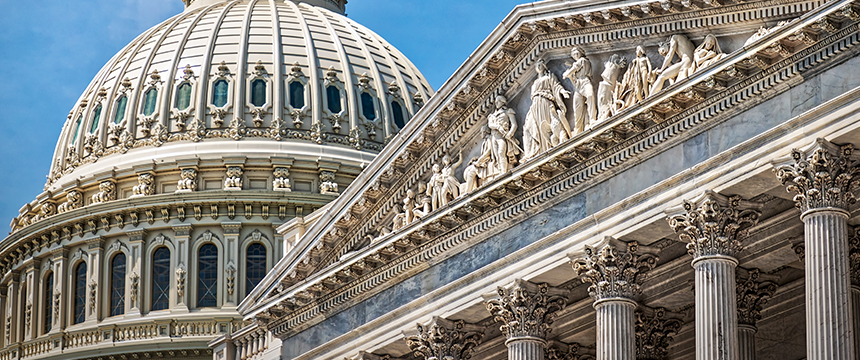2023 Update on Antitrust Enforcement in Labor and Employment
October 23, 2023

The year 2023 will be remembered as a milestone for the U.S. Department of Justice (DOJ) and Federal Trade Commission (FTC, and, together with the DOJ, the “Agencies”) in their efforts to expand antitrust enforcement to labor markets. This article provides an update on the Agencies’ latest antitrust efforts in the field of labor and employment.
- FTC Proposing a Nationwide Ban on Noncompetes. In January, the FTC proposed a regulation that, if adopted, would ban virtually all employee noncompete agreements across the United States. The FTC’s proposal garnered over 21,000 comments in response, with comments running the gamut from opposition to support. The FTC is currently working through these comments, with a view towards releasing a final rule as early as Q1 of 2024. Although many commenters have urged the FTC to narrow its proposed rulemaking — if not abandon the effort completely — many observers anticipate the FTC to move forward with a broad ban on noncompetes, consistent with the FTC’s original proposal. Meanwhile, organizations such as the U.S. Chamber of Commerce have declared an intent to challenge in court any noncompete ban the FTC might propose, arguing that the FTC simply does not have authority to adopt regulations on labor. Going forward, the HR community should be prepared for a fast-moving regulatory rollercoaster ride, where the FTC could propose a broad ban on noncompetes only for the proposal to be temporarily (or permanently) suspended a short while later as the dispute plays out in court.
- Incorporating Labor into Merger Reviews. In July, the FTC and DOJ jointly announced a comprehensive overhaul of the federal Merger Guidelines, the guidance that lays out how the Agencies analyze mergers under the antitrust laws. Among other changes, the Agencies have proposed expanding the Merger Guidelines to, for the first time, consider whether a merger may result in an employer gaining the “power to cut or freeze wages, exercise increased leverage in negotiations with workers, or generally degrade benefits and working conditions without prompting workers to quit.” The Agencies received approximately 1,600 comments in response to the proposed revision, which the Agencies are reviewing before finalizing the updated guidance.
- Proposal to Include Labor Information in HSR Filings. In addition to the Agencies’ efforts to expand the substantive standards for reviewing mergers under the Merger Guidelines, the Agencies are also proposing significant procedural changes to the information that needs to be submitted with “Hart-Scott-Rodino” (HSR) filings, which are the filings that must be submitted to the Agencies at least 30 days before certain $111.4 million-or-greater transactions may close. Among other changes, the Agencies have proposed expanding the HSR form to require data about the merging parties’ top-five categories of workers as classified by the Bureau of Labor Statistics’ Standard Occupational Classification system, with additional geographic information required in the case of overlaps between the merging parties. The Agencies have also proposed requiring information about any adverse penalties or findings issued against the merging parties in the past five years by either the NLRB, OSHA, or the DOL’s Wage and Hour Division. The Agencies received more than 700 comments in response to the proposed HSR reforms — including detailed comments by this law firm — and final rules are expected to be announced in 2024.
- Withdrawal of Guidance on Wage Information-Sharing. In February and July, respectively, the DOJ and FTC withdrew from a longstanding healthcare policy statement that, among other things, established an antitrust “safety zone” for sharing information about wages or benefits (e.g., wage surveys) when certain safeguards are followed. In announcing its withdrawal, the DOJ argued that the 27-year-old policy statement was “overly permissive” and “outdated.” Rather than updating the safety zone, however, the Agencies eliminated the safety zone altogether. Instead, the Agencies will consider the legality of information exchanges on a fact-dependent, case-by-case basis.
- Despite Trial Setbacks, DOJ Remains Dedicated to Criminal No-Poach and Wage-Fixing Enforcement. In May, a federal district court in Connecticut granted a judgment of acquittal to six defendants in a criminal “no-poach” case. This acquittal marked the DOJ’s fourth trial loss out of four contested attempts since 2016, when the Agencies first announced that no-poach or “wage-fixing” cases could be prosecuted criminally. Despite these trial setbacks, the Assistant Attorney General in charge of the DOJ’s Antitrust Division reiterated in a September speech that the DOJ remains “as committed as ever” to prosecuting no-poach and wage-fixing cases criminally where appropriate.
- Renewed Focus on Interlocking Directorates. The Agencies have also reinvigorated their enforcement of Section 8 of the Clayton Act (Section 8), which broadly prohibits individuals from serving as an officer or director of two competing corporations at the same time, subject to certain exceptions. The DOJ has launched “the broadest enforcement program in the history of Section 8,” with more than a dozen active investigations reportedly in progress. In August, the FTC, for its part, brought its first Section 8 case in 40 years. Suffice to say that the Agencies are enforcing Section 8 aggressively — so aggressively, we have argued, as to potentially exceed the requirements of Section 8 altogether.
- Increased Collaboration with Federal Labor Enforcers. Finally, the Agencies are taking administrative steps to increase interdepartmental dialogue and collaboration with the agencies that enforce the federal labor laws. Starting in 2022 and continuing into 2023, the DOJ and FTC signed separate memoranda of understanding with the DOL and NLRB to establish formal lines of communication between federal antitrust and labor enforcers. For instance, in an antitrust-related merger investigation, the FTC or DOJ may occasionally discover evidence of potential, non-antitrust-related violations of federal labor laws. These memoranda of understanding serve to educate the Agencies’ staff about federal labor laws and create a mechanism for the Agencies’ antitrust staffs to refer any matters they may discover to their counterparts at the DOL or NLRB.
We will continue to monitor the Agencies’ efforts to expand antitrust enforcement in labor markets. In the meantime, if you have any questions or concerns about these developments, please contact your Foley & Lardner Antitrust and Competition or Labor and Employment attorney.
Disclaimer
This blog is made available by Foley & Lardner LLP (“Foley” or “the Firm”) for informational purposes only. It is not meant to convey the Firm’s legal position on behalf of any client, nor is it intended to convey specific legal advice. Any opinions expressed in this article do not necessarily reflect the views of Foley & Lardner LLP, its partners, or its clients. Accordingly, do not act upon this information without seeking counsel from a licensed attorney. This blog is not intended to create, and receipt of it does not constitute, an attorney-client relationship. Communicating with Foley through this website by email, blog post, or otherwise, does not create an attorney-client relationship for any legal matter. Therefore, any communication or material you transmit to Foley through this blog, whether by email, blog post or any other manner, will not be treated as confidential or proprietary. The information on this blog is published “AS IS” and is not guaranteed to be complete, accurate, and or up-to-date. Foley makes no representations or warranties of any kind, express or implied, as to the operation or content of the site. Foley expressly disclaims all other guarantees, warranties, conditions and representations of any kind, either express or implied, whether arising under any statute, law, commercial use or otherwise, including implied warranties of merchantability, fitness for a particular purpose, title and non-infringement. In no event shall Foley or any of its partners, officers, employees, agents or affiliates be liable, directly or indirectly, under any theory of law (contract, tort, negligence or otherwise), to you or anyone else, for any claims, losses or damages, direct, indirect special, incidental, punitive or consequential, resulting from or occasioned by the creation, use of or reliance on this site (including information and other content) or any third party websites or the information, resources or material accessed through any such websites. In some jurisdictions, the contents of this blog may be considered Attorney Advertising. If applicable, please note that prior results do not guarantee a similar outcome. Photographs are for dramatization purposes only and may include models. Likenesses do not necessarily imply current client, partnership or employee status.
Author(s)
Related Insights
December 22, 2025
Labor & Employment Law Perspectives
‘Tis the Season
‘Tis the Season… You probably do not think of HR compliance when you hear the phrase. But the end of 2025 is a good time — even in the…
December 15, 2025
Labor & Employment Law Perspectives
Minor Questions to Belabor in the NIL Era: The Status of High School Athletes
For years, many have advocated that participation in college athletics is “work” and, consequently, college athletes should be treated as “employees” of the schools they attend under federal and state labor and employment laws.
December 15, 2025
Labor & Employment Law Perspectives
Updates for Overtime and Tip Reporting Obligations for 2025
As we wrote on July 14, 2025, the One Big Beautiful Bill Act (OBBA) contains a provision providing a tax deduction for employees’ overtime income in 2025 through 2028.
